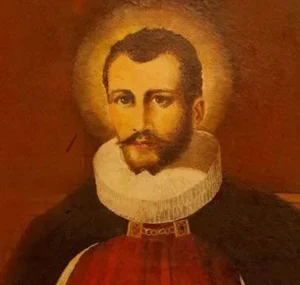Patron SAINT

Edmund Campion was born on January 25th, 1540, and educated at St. John’s College, Oxford. His father was a bookseller of Greek, Hebrew, and Latin books. Even as a boy, Edmund had the honor of reading an address in Latin before Queen Mary Tudor on her visit to Oxford. He was also a great orator.
Edmund was born a Protestant, became a deacon of the Anglican Church, and was even preparing for ordination in that church. But his studies convinced him of the untenable position of the Anglican Church. Meanwhile, he was attracted to the Catholic Church. He, therefore, left his college at Oxford, went to Dublin, and ultimately, arrived at Douai in Northern France. There, he became a Catholic and joined the English College founded in 1568 by Cardinal William Allen to train priests for the highly dangerous “English Mission.” He became a priest and went on to Rome, where he joined the Society of Jesus.
In 1580, he was sent to England to minister to Catholics. At this time, Catholic practices were strictly prohibited in England. After precariously ministering in various parts of England, he caused a sensation by having 400 copies of his “Decem Rationes” (Ten Reasons) against the Anglican Church distributed in St. Mary’s Oxford before the degree-giving ceremony on June 27th, 1581. Shortly afterward, on July 14th, he was betrayed by a spy named George Eliot, arrested, and taken to London.
Imprisoned for four days in the Tower of London in a tiny cell called “Little Ease,” Campion was then questioned by three Privy Councilors on matters including whether he acknowledged Queen Elizabeth to be the true Queen of England. He replied that he did, and was offered his freedom, wealth, and honours, including the Archbishop of Canterbury, which he could not accept in good conscience. Campion was imprisoned in the Tower for more than four months and tortured. False reports of a retraction and a confession by Campion were circulated.
He was arraigned and indicted on 14 November 1581 at Westminster on a charge of raising sedition in the realm and dethroning the Queen.
The trial was held on 20 November 1581. After hearing the pleadings for three hours, the jury deliberated an hour before delivering its verdict. Campion was found guilty of treason. He answered the verdict: In condemning us, you condemn all your ancestors, all our ancient bishops and kings, all that was once the glory of England—the island of saints, and the most devoted child of the See of Peter.
Lord Chief Justice Wray read the sentence: “You must go to the place from whence you came, there to remain until ye shall be drawn through the open city of London upon hurdles to the place of execution, and there be hanged and let down alive, and your entrails taken out and burnt in your sight; then your heads to be cut off and your bodies divided into four parts, to be disposed of at Her Majesty’s pleasure. And God have mercy on your souls.”
After spending his last days in prayer, he was hanged, drawn, and quartered on 1 December 1581. Campion was 41 years of age.
Edmund Campion was beatified by Pope Leo XIII on 9 December 1886 and was canonized nearly eighty-four years later, in 1970, by Pope Paul VI as one of the Forty Martyrs of England and Wales. His feast day is celebrated on 1 December, the day of his martyrdom.
